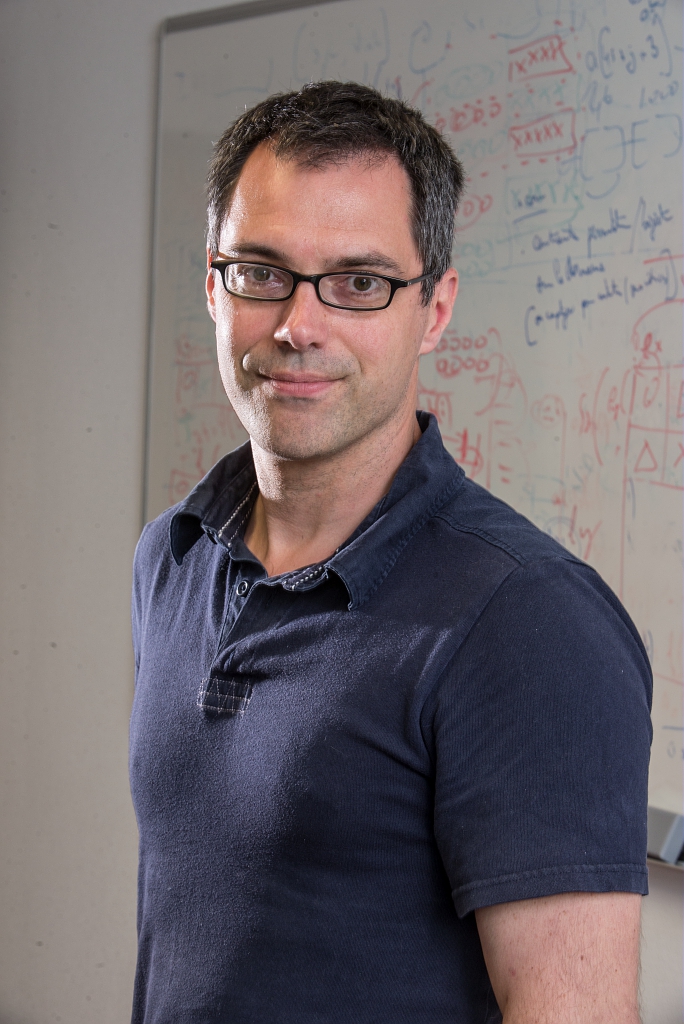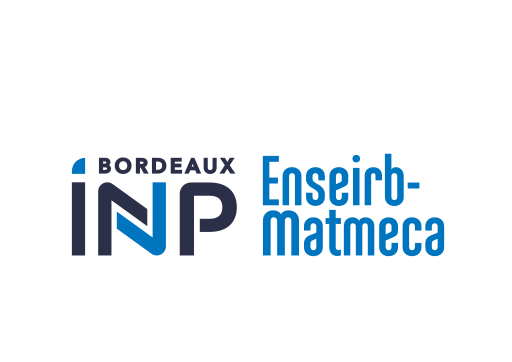I am Professor in Computer Science at Bordeaux INP, ENSEIRB-MATMECA.
My fields of interest in research are optimization, compilation for high
performance computing applications and interactions with runtime
systems. In particular, I am interested in algorithm recognition
applied to optimization, high level languages for HPC, compilation/optimization for parallel
machines and performance analysis.
 © Inria / Photo H. Raguet
© Inria / Photo H. Raguet


Teaching
I'm teaching at the the ENSEIRB/MATMECA, Bordeaux INP engineering school.
My teaching pages can be found at ENSEIRB-MATMECA moodle web site. My teaching schedule is
available on-line. Both web sites require an account at ENSEIRB-MATMECA and are in French. Currently, I'm teaching architectures, parallel architectures, procedural worlds.
Research Software
All software of STORM team can be found in its page. I'm particularly involved in the development of:• AFF3CT: A Fast Forward Error Correction Toolbox. AFF3CT is an Open-source software (MIT license) dedicated to the Forward Error Correction (FEC or channel coding) simulations. It is written in C++11 and it supports a large range of codes: from the well-spread Turbo codes to the very new Polar codes including the Low-Density Parity-Check (LDPC) codes. A particular emphasis is given to the simulation throughput performance (hundreds of Mb/s on today's CPUs) and the portability of the code.
• MIPP: MIPP is a portable and Open-source wrapper (MIT license) for vector intrinsic functions (SIMD) written in C++11. It works for SSE, AVX, AVX-512 and ARM NEON (32-bit and 64-bit) instructions. MIPP wrapper supports simple/double precision floating-point numbers and also signed integer arithmetic (64-bit, 32-bit, 16-bit and 8-bit).
With the MIPP wrapper you do not need to write a specific intrinsic code anymore. Just use provided functions and the wrapper will automatically generates the right intrisic calls for your specific architecture.
• PARCOACH: As current scientific applications mainly rely on the Message Passing Interface (MPI) parallel programming model, new hardwares designed for Exascale with higher node-level parallelism clearly advocate for an MPI+X solutions with X a thread-based model such as OpenMP. But integrating two different programming models inside the same application can be error-prone leading to complex bugs – mostly detected unfortunately at runtime. The PARallel COntrol flow Anomaly CHecker, aims at helping developers in their debugging phase. It combines static and dynamic analyses to detect misuse of collectives in parallel applications.
Previous Software Projects
I was previously involved in the development of the following softwares:• MAQAO: MAQAO is a
Modular Assembly Quality Analyzer and Optimizer. The goal of the tool
is to give the developper an estimation of the gap between the
performance of a code and its peak performance. The estimation is
based on a static performance model and can be completed with
execution profiles. The software has been co-developped with the former Intel Exascale lab from Versailles. It is part of
VI-HPS Institute.
licence is GPL.
• X-Language: X-Language is a pragma language for the compact representation of multiple versions. By annotating C code with these pragmas, the user can describe multiple optimization sequences. The software is GPL and is based on TinyC compiler.
Research activities
I'm participating to the Euro-HPC project Microcard  on numerical modeling of cardiac electrophysiology at the cellular scale and to the ANR project Exacard.
on numerical modeling of cardiac electrophysiology at the cellular scale and to the ANR project Exacard.
 on numerical modeling of cardiac electrophysiology at the cellular scale and to the ANR project Exacard.
on numerical modeling of cardiac electrophysiology at the cellular scale and to the ANR project Exacard.I'm part of the CoHPC associate team with LBNL and U.California, and Maelstrom associate team with Simula.
Current PhD students
► V. Alba: PhD on Task scheduling for Exascale.
► B. Coye (with Ubisoft): PhD on Dynamic tash graph scheduling with composition, co-directed with R.Namyst
► D. Orhan: PhD on Modeling and dynamic optimization of software radio chains on heterogeneous architectures. Co-directed with C.Jego
PhD Alumni
► V.-M. Nguyen. Compile-time Validation and Optimization of MPI Nonblocking
Communications, 2022, U.Bordeaux PhD thesis, co-directed with P. Carribault (CEA).
► C. T. Ait Kaci. Static and dynamic analysis for memory access concurrency error detection in
in MPI-RMA applications, 2022, U.Bordeaux PhD thesis. Now research engineer at Cap Gemini.
► A. Cassagne. Optimization and parallelization methods for software-defined radio, 2020, U. Bordeaux PhD thesis, co-directed with Pr. C.Jego. Now Ass.Professor at Paris Sorbonne University
► P. Huchant. Static Analysis and Dynamic Adaptation for Parallelism, 2019, U. Bordeaux PhD thesis. Now Senior Software Engineer at Synopsis Inc, Bordeaux
► H. Brunie. Optimization of data allocation for HPC applications on heterogeneous memory architectures, 2019, U. Bordeaux PhD thesis, co-directed with P. Carribault (CEA). Now Postdoc at Inria Grenoble.
► C. Haine. Kernel Optimization by Layout Restructuring, 2017, U. Bordeaux PhD thesis. Now research engineer at HPE, Swizerland.
► G. Vaumourin. Hybrid Memory Hierarchy and Dynamic Data Handling in Embedded Parallel Architectures., 2016, U. Bordeaux PhD thesis. Now research engineer at ATOS/Bull, Grenoble.
► E. Saillard. Static/dynamic/iterative analyses for validation and improvement of multi-models HPC applications, 2015, U. Bordeaux PhD thesis. Now Inria Researcher.
► B. Putigny. Benchmark-driven Approaches to Performance Modeling of Multi-core architectures, 2014, U. Bordeaux PhD thesis. Now HPC engineer at Total, Pau.
► S. Henry. Programming Models and Runtime Systems for Heterogeneous Architectures, 2013, U. Bordeaux PhD thesis. Now engineer at IOHK.
► A. Duchateau.Automatic Algorithm Derivation and Exploration in Linear Algebra for Parallelism and Locality, 2013, UIUC PhD thesis, co-directed with Pr. D. Padua. Now software engineer at Pure Storage, Mountain View, USA.
► A. Mazouz. Une Etude Empirique des Performances des Applications OpenMP sur les Plateformes Multi-coeurs, 2012, UVSQ PhD thesis, co-directed with Pr. S.-A. Touati. Now R&D software engineer at Intel, Paris.
► A. Charif-Rubial. On code performance analysis and optimization for multicore architectures, 2012, UVSQ PhD thesis, co-directed with Pr. W. Jalby. Now CEO of PEXL company.
► J. Jaeger. Source-to-source transformations for irregular and multithreaded code optimization, 2012, UVSQ PhD thesis. Now Research engineer at CEA.
► P. De Oliveira Castro Herrero. Expression and optimization of data reorganizations on data flow parallelism
, 2010, UVSQ PhD thesis. Now Ass. Professor, HDR, at Paris-Saclay University, Versailles St Quentin en Yvelines.
► S. Donadio. Iterative optimization of performance libraries by hierarchical division of codes, 2007, UVSQ PhD thesis, directed by and co-advised with W. Jalby. Now CTO at TradAir, New York, USA.
► C. Alias. Program Optimization by Template Recognition and Replacement, 2005, UVSQ PhD thesis, directed by and co-advised with P. Feautrier. Now Inria Researcher, HDR.
Postdoc
► Lilia Ziane Khodja (2014), Modeling of parallel HPC applications running on platforms composed by modern multicore nodes interconnected with high performance networks, with B.Goglin. Now Consultant at ANEO;
Engineers
► P. Virouleau, working with ATOS on Parcoach project (2022-2024)
► M. Makni, working on H2020 Microcard project (2022-2023)
► C. Sakka, working on ANR Exacard project (2021-2022). Now engineer at ANEO.
► K. He, working on AFF3CT (2018-2019), with A. Cassagne and O. Aumage. Now engineer at Inria, team Storm, working on StarPU;
► A. Cassagne, working on optimizing Error Correcting Codes (2015-2016), with B. Le Gal (IMS), C. Leroux (IMS) and O. Aumage. Now Ass.Professor at Paris Sorbonne University;
► J. Tombi A Mba, working on MAQAO for Arm (2014-2015), with O. Aumage. Now engineer lead tech at LabSoft;
► T. Meunier, working on performance analysis for vectorization and data restructuring (2013), with O. Aumage;
Publications